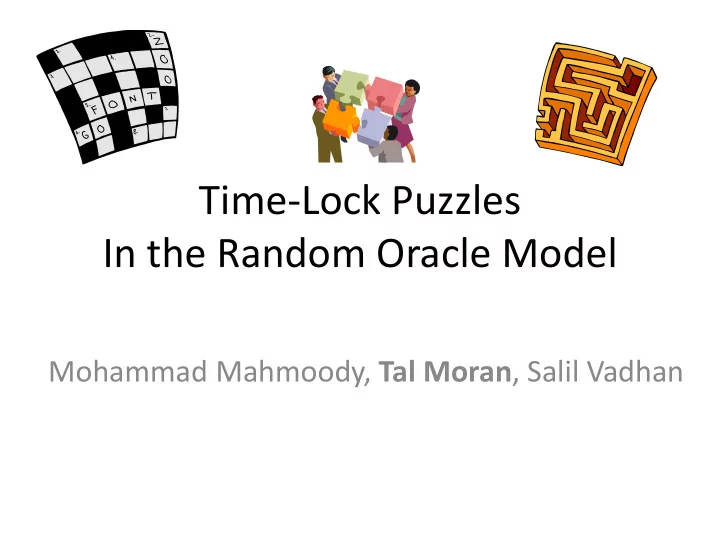

Time-Lock Puzzles In the Random Oracle Model Mohammad Mahmoody, Tal Moran , Salil Vadhan
Time-Lock Puzzles • Sending an encrypted message to the future – shouldn’t be revealed before some future date – no safe storage for secrets • Encode key as a “time - lock” puzzle – Bounds for computation time to solve puzzle • e.g., can be solved in 25 years on reasonable computer • Requires at least 20 on today’s fastest computer – Puzzle generation is fast Also useful for: fair contract signing, sealed-bid auctions, coin flipping and more [RSW96,BN00,…]
Naïve Puzzle • Invert a one-way function – Give some of the input to reduce search space – (Assume brute-force is the only attack) y=f(x 1 ,x 2 ,… ,x 100 ) ,x 1 ,x 2 ,..x 50 • Attackers might have many more computers! – e.g., Botnets , “cloud” servers. – Shouldn’t gain a large advantage over legitimate solver (with one computer) • Want a puzzle that is inherently sequential
Known Solutions [RSW96] • Exponentiation (modulo N) f(x)=2 2x mod N – Fastest known method is repeated squaring • takes Ω (x) time – Can solve puzzle quickly if (N)=(p-1)(q-1) is known • compute x’=2 x mod (N) Takes time O(log(x)+log(N)) • compute 2 x’ mod N • Requires RSA assumption – what about quantum botnets? – Can we use other assumptions?
The Random Oracle Model • Answer to each query is uniformly random (independently of other queries) • The same query always gets the same answer • Complexity: count # of queries • Random Oracle is one-way even for computationally unbounded players – Impossibility results in RO rule out black-box constructions in standard model • Heuristic for converting RO protocols to standard model – Replace RO with cryptographic hash (e.g. SHA256) – Not provably secure, but is used in practice $#@%: Yes
Our Results: Overview • Main Result: – Time-lock puzzles that require n queries to generate can be solved in n parallel steps. – Rules out black-box constructions (total # queries from one-way/hash functions polynomial in • Positive result: honest solver) – Simple Time-lock puzzle satisfying Generator with • n parallel queries to construct n parallel CPUs - • n sequential queries required to solve n times faster than solver
Main Result • High-level Sketch: Based on ideas from attacks on key-exchange protocols in the random oracle model [IR89,BM09] – Construct adversary that finds intersection queries Puzzle Generator Puzzle Solver
Main Result • High-level Sketch: – Construct adversary that finds intersection queries Puzzle Generator Puzzle Solver
From generator’s point of Main Result view, “real” answers are identical to “fake” on unqueried indices • High-level Sketch: – Construct adversary that finds intersection queries – Run honest solver with simulated oracle • Answer known queries correctly, others randomly – Success prob. identical to honest solver – Main hurdle: find intersections with low adaptivity
Finding Intersection Queries (efficient adversary with non-optimal adaptivity) • For all ε , adversary uses n/ ε rounds of queries – Queries in each round can be done in parallel • In each round: # queries Adversary’s used by – Simulate honest solver error prob. generator – Answer known queries correctly, others randomly – Ask all queries to real oracle in parallel after every round • Output results of randomly chosen round
Finding Intersection Queries: Analysis • Success probability: 1- ε – If simulation in output round did not hit any new intersection queries: simulated output is identically distributed to honest output (success probability is 1) – Generator asks at most n queries • Adv. asks a new intersection query in at most n rounds – Random round hits all intersection queries with prob. 1- ε # queries • Query complexity: nm/ ε for honest solver • Computational complexity: – polynomial in honest solver complexity
Positive Construction • Time- lock puzzle encodes “pointer chain” – Generator queries in parallel – Solver must serially follow pointers y 0 y 1 y 2 y 3 If adversary does not query oracle, it cannot do better than guessing next pointer S x 0 x 1 x 2
Discussion and Open Questions • Optimally Adaptive (but inefficient) adversary – Uses n rather than n/ ε adaptive rounds – Based on new learning algorithm for intersection queries. • Corollary: – “ Merkle puzzles” can be solved in linear parallel time • Our negative result does not rule out “proofs of work” – In a proof-of-work, puzzle generator can verify solution quickly but not solve. – Positive solutions exist (work in progress) • Still open: – Other time-lock puzzles in standard model? – Time-lock puzzles for quantum computers? • Related to [BHKKLS11] ( coming soon to a lecture hall near you!)
Recommend
More recommend